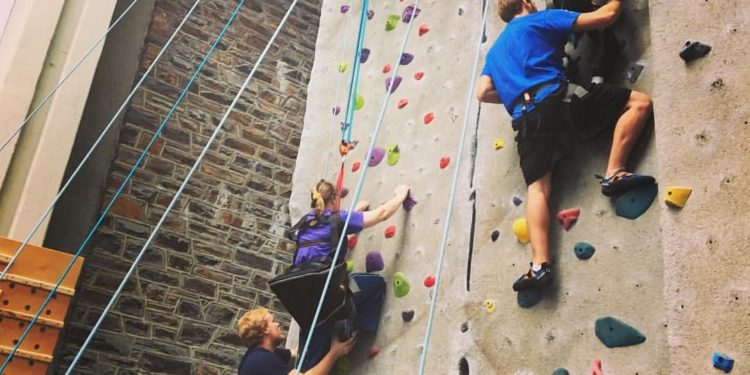Adaptive programming is a continuously growing component of recreation programs across the country. Programs have embraced this opportunity for inclusion in many different facets. These include accessible programs, facility renovations, and partnerships with organizations like Special Olympics and Unified Sports.
In 2013, two graduate students approached the Outdoor Adventures program at Duke University with an idea to start an adaptive climbing program. Through several grants, multiple partnerships and hours of volunteer work, we launched Duke Adaptive Climbing. Eight years later, this program continues to serve hundreds of participants across North Carolina each year. We have even sent several climbers to compete in national and world tournaments with USA Paraclimbing. We have learned a lot throughout this process and continue to learn more every day. However, this program has served as a model for us to expand adaptive recreation throughout our department.
EXTRA CREDIT: When it comes to serving patrons with special needs in the rec center, Portland State University goes above and beyond.
While every institution functions differently and serves different populations, there are some common concepts that will assist in establishing and assuring the success of an adaptive program. We should approach adaptive programming with the same mindset as we do with wilderness medicine. In wilderness medicine, we identify our ailment, evaluate our resources and implement a solution. So, modifying a program to meet a particular need is a similar concept. As a result, we first identify our participant needs, evaluate our resources and implement an adaptation to our activity.
Identify Your Mission
First and foremost, always understand the “why” behind your programming. Gain a strong understanding of your goal. Share whether your intention is to:
- Provide a form of therapy.
- Further expand your community.
- Provide an inclusive program.
Whatever your intuition is, you should always understand your overall goal and continue to revisit it.
Inventory Your Activities
Determine which activity or activities you want to focus on. Are you focusing on adventure programming, sports or general recreation? Will you operate solely indoors or outdoors, or both? Determine which activity you have the most potential to adapt to meet varying needs and start there. Understand the location(s) that are available to you. Identify the mobility barriers that may be present.
Identify Your Population
Who will this program target? Will you be open to physical and intellectual or developmental delays? Are you open to the community or is this program focused on participants of your organization? Understanding your population will help you to further identify adaptations that will need to be made. Establish participant-to-staff ratios. Understand these ratios may be different than your standard programming to meet participant needs.
Identify Your Resources
What partners do you have both within and outside of your organization? Get in touch with various support groups or advocacy organizations in your area. Are there organizations nearby that are offering similar programs you can tap into? Great starting points include:
- Special Olympics & Unified Sports
- Wounded Warriors
- Move United
- Paradox Sports
- Catalyst Sports
- National Ability Center
With a worldwide presence, these organizations have great resources and far-reaching communities. You may have the technical background to facilitate an activity, but understanding varying participant needs and how to accommodate those can take time and experience. Utilize your resources to gain that insight and provide training opportunities.
Program Structure
Specialized adaptive recreation events are those held on a weekly, monthly or quarterly basis. This structure allows you to better control your environment to accommodate all the needs of your participant. However, specialized programs may require more financial and human resources. Integrated adaptive recreation is an effort to make you standard programming fully inclusive. By integrating adaptive needs, you can work toward building communities of adaptive and able-bodied participants recreating together. However, there can be some challenges in controlling your environment to accommodate participant needs. Integrative programming may also require in-depth training for all your staff on adaptive systems and participant needs.
Program Sustainability
Start thinking about this early, planning for the growth and development of your program. How will you continue to connect with new participants/volunteers to keep your program evolving? Will you establish a staff to run your program, or will you rely on volunteers to assist with your programming?
Key Elements to Successful Adaptive Programming
- Environment. The ability to control your environment is extremely important. Whether it is ensuring accessibility for your participants with mobility needs or controlling outside noise to limit sensory stimulations.
- Developing a Mission. Establish your overall goals with your program and continually revisit. What is your focus: first-timers, groups or competitors?
- Partnerships. Establish good partnerships within your organization and local area to provide the highest quality services. Utilize outside knowledge to best meet varying needs.
- Training. Technical training is very important. Ensure your staff have an intimate understanding of all adaptive systems being used and can apply these systems to any situation. Even more important is understanding your participant needs and what you can do to accommodate them. Understanding disabilities is important to know what may or may not help a participant succeed.
- Sustainability. Keep your adaptive program moving in sync with the rest of your operation.
EXTRA CREDIT: Read about Eastern Kentucky University’s adaptive climbing program.
Image courtesy of Duke Recreation & Physical Education










